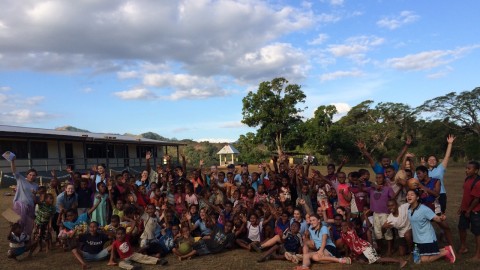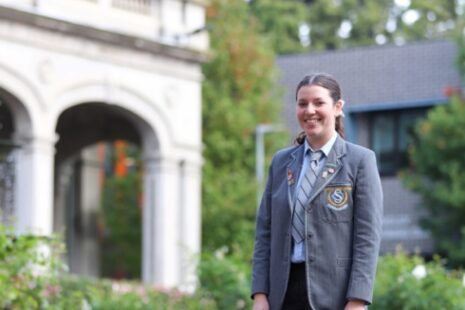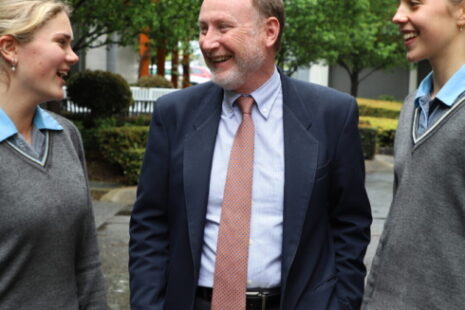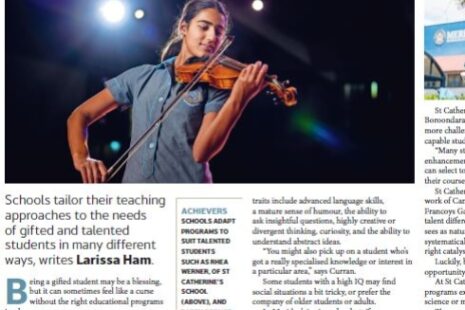The Coconut Model

On their return from the Fijian Highlands, as part of St Catherine’s Heyington to Highlands program, our Year 9 students produced some wonderful reflective writing about their experiences. Kavina Kalaichelvam provides this insightful and mature reflection on her time in Fiji.
We often hear about a moment that changes a person’s life. A defining moment that changes your perception on everything: a risk you took, a book you read, a speech you heard. However, in the case of Fiji, I am hooked on the fact that it wasn’t one day, or one moment that affected me, but rather a series of characterising events.
Perhaps the only way to reflect on this trip is to compare it to something like a coconut. A fruit that, since its introduction, has filled people with optimism and wholesomeness. That despite all the ridges on its hard surface outside, is renowned for its sweetness inside. Maybe this is what Fiji really did, it didn’t change us or our lives forever, but simply showed us the best of not only ourselves, but those around us as well.
We all knew this trip was going to be great, after all we had heard such amazing reviews and experiences of it. But, like drinking fresh coconut juice on a hot day, you never know how good it truly is, or how much you’ve needed it, until you’ve had some yourself.
Having left a society highly revolved around time, it was daunting to have to live in a place where the most knowledge they had about the time was that it was, simply, dark. Or, in our case, when a supposed one hour walk followed by a truck ride morphed itself into a four hour consecutive hike, where the destination was always ‘just around the corner’. Although disorientating at first, it was this lack of something so pivotal in our lives that allowed us to play duck-duck-goose or kick a soccer ball around for much longer than we ever have, because we knew we had nowhere else to be. The knowledge that you could do nothing and there would always be a Fijian kid running up to you shouting ‘Bula’ or someone inviting you into their home, until it was so ridiculously hard to not give in. It was this transportation to a place shaped by not time, but fun and genuine happiness that enabled us to embrace the ‘sweetness’ of Fiji.
It was also the strength of the community that astounded us. Like a coconut, the people of Navaga were hard. Real hard. As in these kids would climb 10metre sand dunes and only rely on old vines and each other to save themselves. It was this unspoken commitment to each other knowing that they all had each other’s backs; this quiet resounding force of empowerment between them. From the kitchen to the river, they literally designated a child to each of us so that we wouldn’t fall and twist our quite pathetic ankles. It’s this mutual respect that we’ll remember Navaga for, their trust in letting their children disappear for hours on end with these strange girls from another country.
I tried to think of how I could incorporate coconuts into this paragraph, and in doing so I remembered one of the nights in the village. A few of us were sitting in a circle, just outside where we slept, writing in our journals. Then, Masi, one of our Fijian leaders, who we liked to call ‘Chief’ (because of his profound leadership and kindness) walks in at 10pm with a coconut and cups, knowing full well that we are all, indeed, constipated.
It was simple acts like this that encapsulate the essence of our Heyington to Highlands trip. The people we met in Navaga were the embodiment of respect, and everyday their selflessness and kindness amazed us. Their ability to sit for hours cross-legged while we all squirmed our way through the church service, trying desperately to find a comfortable way until deeming it impossible, taught us that our orientation of the world is not hard-wired. By the end of the trip, despite our knees being dead, we were able to count to ten in Fijian, as well as be able to make brooms out of coconut leaves. Now, while we’ll most likely never be able to have to know these things, it was this absolute immersion of not only their culture, but their homes and the people that made it incredibly hard to leave.
However, when the whole village knows your whole background of where you’re from and you’ve been labelled ‘same same but different’ on multiple occasions, you know the coconut’s cracked and it’s probably time to leave. But, with the crack comes the coconut juice; the sweet stuff that always seems to come just before you need to leave a village. And, no matter how much we didn’t want to leave the village, we realised we had to. Crying our way out of the back of those trucks, us St Catherine’s/Navaga girls realised that life wouldn’t stop. That we were now on the precipice of it all, with the opportunity to grab what we’ve experienced and run with it. After all, coconuts don’t fall for nothing.





